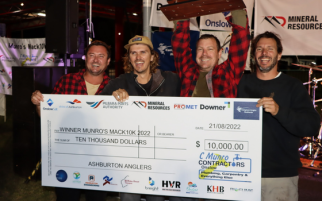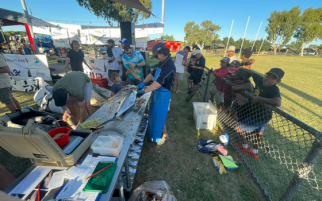Recfishwest recently had the pleasure to attend the 2022 Munro’s MACK10K competition in Onslow to run our Fishing for Science program – and the mackies came thick and fast for our sampling table!
The annual competition, hosted by the Ashburton Anglers Fishing Club, pulls in hundreds of passionate fishers from across the state, with impressive prizes on offer across more than a dozen challenge categories.

Working in collaboration with Paul Lewis from DPIRD, our Recfishwest staff were directly involved in gathering data from Spanish mackerel brought into the weigh-in station from 233 competitors across 69 boats.
Thanks to the contribution of the friendly local anglers, our Fishing for Science program collected data from more than 60 mackerel. This included their weight, length, condition, sex and maturity stage.
CHECK OUT OUR FISHING FOR SCIENCE PAGE HERE
Not only did our Recfishwest Operations Officer Sam Russell also take belly samples from each fish for future research, but he was also elected as “resident fish filleter” for the competition! Sam sliced and diced his way through plenty of mackerel for several hours straight each night, before handing fillets out to grateful members of the community from anglers kindly donating their impressive catches.
In addition, Paul from DPIRD took the otoliths from the 61 sampled fish donated by the competitors to determine their age, with the finalised data to be used in conjunction with commercial catch data to provide clear assessments of the Spanish mackerel stock in the Pilbara Management Area – so a win-win for the local community, DPIRD and the future of these spectacular pelagic powerhouses.

“Thanks to the fantastic response and keen interest of the Onslow fishing community who are just as passionate as we are about fish sustainability and research, Fishing for Science is a great way for fishers to learn more about the fish they love to catch while contributing toward the collection of data that will benefit the fishery in the future,” said Recfishwest Operations Officer Sam Russell.
“We need to say a huge thanks to Paul from DPIRD for his tireless sampling efforts and the crew at Ashburton Anglers for their hospitality during this great annual competition. Having a yarn with the locals and participants shows how much they care about the fish being caught.”
Congratulations to all 15 category winners from the Munro’s MACK10K competition and watch this space for future Fishing for Science initiatives.